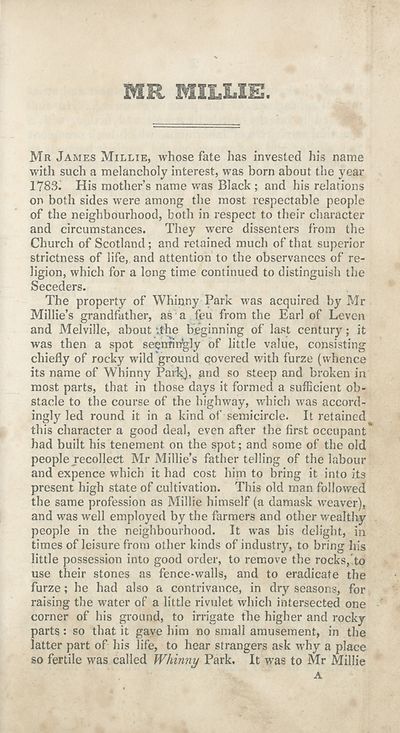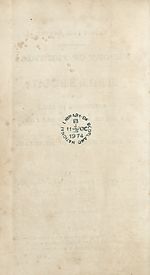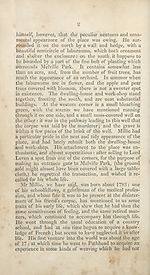Download files
Complete book:
Individual page:
Thumbnail gallery: Grid view | List view

MR MILLIE.
Mr James Millie, whose fate has invested his name
with such a melancholy interest, was born about the year
1783^ His mother’s name was Black ; and his relations
on both sides were among the most respectable people
of the neighbourhood, both in respect to their character
and circumstances. They were dissenters from the
Church of Scotland; and retained much of that superior
strictness of life, and attention to the observances of re¬
ligion, which for a long time continued to distinguish the
Seceders.
The property of Whinny Park was acquired by Mr
Millie’s grandfather, as a feu from the Earl of Leven
and Melville, about ‘the beginning of last century; it
was then a spot seennt%ly of little value, consisting
chiefly of rocky wild ground covered with furze (whence
its name of Whinny Parl^}, and so steep and broken in
most parts, that in those days it formed a sufficient ob¬
stacle to the course of the highway, which was accord¬
ingly led round it in a kind of semicircle. It retained
this character a good deal, even after the first occupant'
had built his tenement on the spot; and some of the old
people jecollect Mr Millie’s father telling of the labour
and expence which it had cost him to bring it into its
present high state of cultivation. This old man followed
the same profession as Millie himself (a damask weaver),
and was well employed by the farmers and other wealthy
people in the neighbourhood. It was bis delight, in
times of leisure from other kinds of industry, to bring his
little possession into good order, to remove the rocks, to
use their stones as fence-walls, and to eradicate the
furze; he had also a contrivance, in dry seasons, for
raising the water of a little rivulet which intersected one
corner of his ground, to irrigate the higher and rocky
parts: so that it gave him no small amusement, in the
latter part of his life, to hear strangers ask why a place
so fertile was called Whinny Park. It was to Mr Millie
Mr James Millie, whose fate has invested his name
with such a melancholy interest, was born about the year
1783^ His mother’s name was Black ; and his relations
on both sides were among the most respectable people
of the neighbourhood, both in respect to their character
and circumstances. They were dissenters from the
Church of Scotland; and retained much of that superior
strictness of life, and attention to the observances of re¬
ligion, which for a long time continued to distinguish the
Seceders.
The property of Whinny Park was acquired by Mr
Millie’s grandfather, as a feu from the Earl of Leven
and Melville, about ‘the beginning of last century; it
was then a spot seennt%ly of little value, consisting
chiefly of rocky wild ground covered with furze (whence
its name of Whinny Parl^}, and so steep and broken in
most parts, that in those days it formed a sufficient ob¬
stacle to the course of the highway, which was accord¬
ingly led round it in a kind of semicircle. It retained
this character a good deal, even after the first occupant'
had built his tenement on the spot; and some of the old
people jecollect Mr Millie’s father telling of the labour
and expence which it had cost him to bring it into its
present high state of cultivation. This old man followed
the same profession as Millie himself (a damask weaver),
and was well employed by the farmers and other wealthy
people in the neighbourhood. It was bis delight, in
times of leisure from other kinds of industry, to bring his
little possession into good order, to remove the rocks, to
use their stones as fence-walls, and to eradicate the
furze; he had also a contrivance, in dry seasons, for
raising the water of a little rivulet which intersected one
corner of his ground, to irrigate the higher and rocky
parts: so that it gave him no small amusement, in the
latter part of his life, to hear strangers ask why a place
so fertile was called Whinny Park. It was to Mr Millie
Set display mode to:
![]() Universal Viewer |
Universal Viewer | ![]() Mirador |
Large image | Transcription
Mirador |
Large image | Transcription
| Antiquarian books of Scotland > Crime & punishment > Whinny Park murder > (15) |
|---|
| Permanent URL | https://digital.nls.uk/126150845 |
|---|
| Description | Thousands of printed books from the Antiquarian Books of Scotland collection which dates from 1641 to the 1980s. The collection consists of 14,800 books which were published in Scotland or have a Scottish connection, e.g. through the author, printer or owner. Subjects covered include sport, education, diseases, adventure, occupations, Jacobites, politics and religion. Among the 29 languages represented are English, Gaelic, Italian, French, Russian and Swedish. |
|---|

